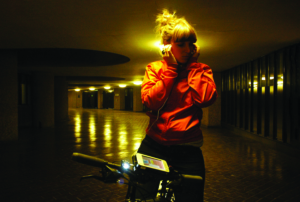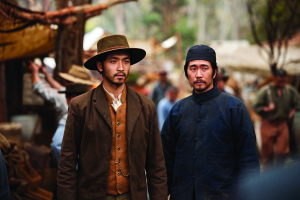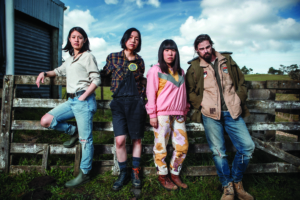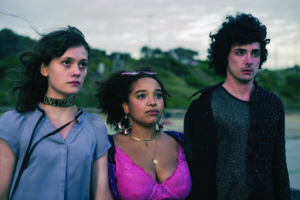There’s something about a slap that makes it the perfect centrepiece for prime drama. Professional wrestlers may make a big show of regularly driving their opponents’ faces into concrete floors, but it’s still the simple slap that draws that quiet ‘ooh’ of anticipation from rabid audiences. Silent film icon Lon Chaney Sr spends his time in Victor Sjöström’s He Who Gets Slapped (1924) delving into masochistic psychological torment by willingly placing himself on the receiving end of a thousand of the belittling blows, perfectly emphasising the extra connotations of power, dominance and degradation that are contained within this simplest of assaults.
ABC TV’s The Slap, an eight-part miniseries based on the novel by Christos Tsiolkas, swings for this kind of bruising psychological resonance in the backyard slap that unleashes the conflicts, tensions and anxieties that lurk within Australia’s middle-class suburban landscape. The dramatic premise is simple: when a well-off local businessman slaps the misbehaving child of a less affluent couple at a mundane barbecue, all those hidden hatreds and cultural divisions finally find an outlet for expression, both in the immediate conflict that follows and the more drawn-out efforts to transform the event from a personal conflict to one that will end up in court.

Simple enough, but despite a strong dramatic foundation, The Slap is ultimately an exercise in announcing drama rather than exploring it, presenting a scenario drenched in forced excess, sensationalism and artistic posturing. Each episode of The Slap is named after and devoted to a (supposedly) key character, but their inner demons and conflicts are all so redundantly similar that The Slap’s primary method of making its point is constant repetition rather than nuanced expression. Rather than offering up moments of intrigue or uncertain and delicate tension, The Slap bombards viewers with misery, failed relationships and abuse.
Rather than offering up moments of intrigue or uncertain and delicate tension, The Slap bombards viewers with misery, failed relationships and abuse.
The Slap is most successful in its first episode, which is unsurprising as this is where the infamous slap takes place. Unfortunately, this success relies on two things that are counter-productive to the remaining instalments of the series: it has an enclosed structure that essentially offers a complete narrative requiring no follow-up, and it resonates primarily as a farcical comedy of excess, delivering broad laughs and veering only towards serious drama in its final moments. Taken as a satirical portrayal of the kinds of desperately prurient lures that high-finance, low-content productions cling to in place of any real dramatic value or relevance, ‘Hector’, The Slap’s first episode, is a roaring success.

From this perspective, Jonathan LaPaglia’s portrayal of Hector, the ‘average’ suburban middle-class protagonist of the first episode, reaches the height of comic overstatement as he swaggers manfully through the overblown suburban-noir setting, steering himself through macho push-up routines, leering at teenage babysitters and reeling into his own backyard barbecue in a drug-addled haze. Hector’s total package of white, male, suburban, middle-class insecurity is so determinedly over-the-top that he seems to be a suburban transposition of Patrick Bateman from Bret Easton Ellis’ American Psycho.
This excessive display of clichéd male anxiety and insecurity does, however, lead to The Slap’s one real moment of success. Everything about Hector’s neurotic, narcissistic, impotent and adolescent mindset positions him as the dastardly soon-to-be slapper, and we’re teased with multiple occasions where Hector attempts to quell an obnoxious and irritating brat who, we’re led to believe, probably has a slap coming to him one way or another.
So when it turns out that it isn’t Hector who takes a swing at the little brat, the story seems to be truly in control of its pacing, structure and dramatic resonance for the first time: just when his adolescent nonsense and lack of ability to cope with his mundane adult existence seems about to explode into disaster, Hector instead sees this moment emerge from one of his relatives, the even more narcissistic, macho and upwardly mobile Harry (Alex Dimitriades). It’s a simple but effective shift of perspective. Hector in a sense witnesses all of his own neuroses about class, race and culture played out before him, as the slap leads to an explosion between the rich, ‘ethnic’ Harry and the working-class, ‘bogan’ Gary (Anthony Hayes) and Rosie (Melissa George).
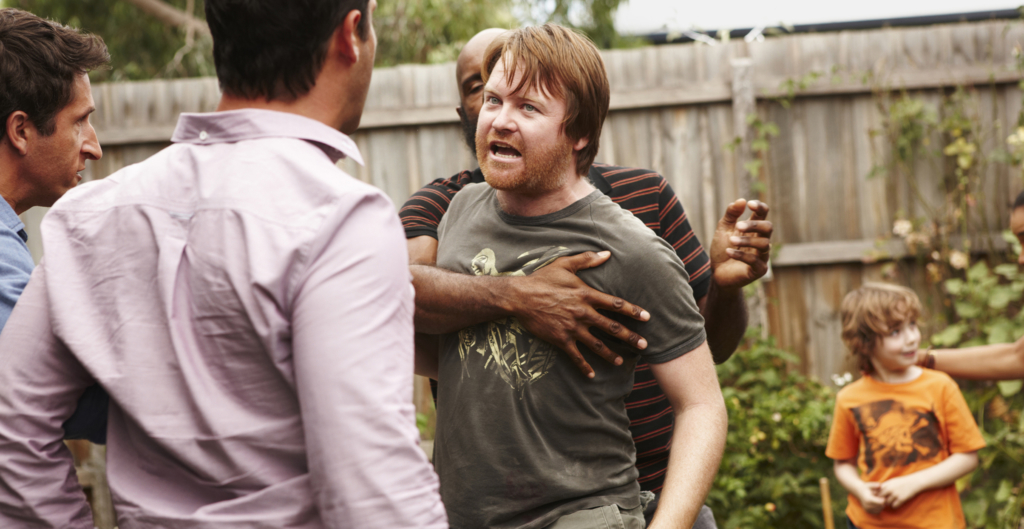
The climactic moment reached, the narrative races organically towards a complex false closure. As if summing up all the conflicts bubbling away inside him, Hector gets a glimpse of the personal and cultural crisis he narrowly avoided. He cleans up the barbecue mess, gets rejected by the young babysitter, has sex with the wife he was previously a bit bored with and retires relatively content back into middle-class normalcy – his moment of dangerous rebellion narrowly averted and his mundane suburban life secure for another seven years or so.
Tight and concise, this careful bait-and-switch of suburban psychopathy dredges up all the tensions that backyard Australia is too polite to bring up as they pretend to get along, and then gives a suitably false resolution, implying a return to suburban norms that is at once a retreat and a victory. The past and future problems of the ‘slapper’ are left potently dangling, while Hector’s own suburbia returns to its comfortable state of ongoing hypocrisy; rather than resolutions there are tensions, which are the sign of real drama.
In part, this first episode holds together well because the dramatic moment is separate to our main focal point (Hector) but still plays out his underlying conflict. His rush back to normalcy (so long babysitter, hello wife) plays out a little like the closing scene of Stanley Kubrick’s Eyes Wide Shut (1999), where the hero’s quest for some kind of sexual, personal and philosophical transcendence ultimately leads nowhere (save for potential disaster), and his wife simply reminds him that it’d probably be a good idea to forget about the whole thing and just ‘fuck’ soon instead.

With or without this positive spin (without it, ‘Hector’ is a silly but well-structured drama), The Slap is essentially over by the time its first episode ends. The clashes and conflicts that fill this suburban Australian backyard (masculinity, femininity, class, status, power, age, control, family, fame, and all the other usual tensions that fill ‘serious’ theatre) have been deployed and The Slap has nothing of substance to add to these conflicts for its remaining seven hours. Having recognised these tensions in its opening episode, it proceeds to recognise them again – and again, and again – restaging its conflicts in a variety of minutely different settings and between some nominally different characters, but invariably to the same end: a cultivated misanthropy that becomes increasingly histrionic and ridiculous as each episode progresses.
The focal incident itself quickly emerges as an excuse to demonstrate just how awful life in suburbia is for everyone who happens to be in the mere vicinity of the slap. Though the dramatic gambit is that the slap will provoke ripples of tension that disrupt the happy facade of suburban life, there’s so little restraint in representing the depths of misery, violence, abuse and degradation that it’s difficult to understand why the drama needs a catalyst at all. Far from teasing out delicate tensions, The Slap offers a simple two-part narrative: a) a kid gets slapped; b) everyone who lives nearby is either a borderline psychopath, a passive, gaping imbecile, or both.

The Slap’s primary motivation seems to be not a dissection of suburban values, but a frontal assault on Australia’s masculine culture. This kind of assault on backyard ‘bloke’ culture is not only valid, but vital, which is why it’s so concerning that The Slap reduces the issue to a divisive propagandistic wedge (‘Whose side are you on?’ as the advertising interrogates) that’s more likely to foster division than build any real cultural bridges or expand cultural horizons. The Slap’s underlying social positions are not inherently objectionable, but their coarse and divisive application makes them ugly, simplistic and largely irrelevant.
Aside from the very cautiously handled Aboriginal character Bilal (Tony Briggs), every prominent male character in The Slap engages in violent physical assault against one of the female characters. The only two men who aren’t directly violent against their wives or female relatives are Hector (who is nevertheless portrayed as a borderline sexual predator with no self-control) and Richie (Blake Davis), who is portrayed as relatively safe thanks to his ‘feminising’ homosexuality (a dull cliché), though he still does little things like masturbate to a stolen photo of the man he believes raped his best friend.

By the time it hits its third episode, the series’ emphasis on the underlying distance between the sexes is already worn out. When children are seen, the young boys are usually bullying the girls over what to watch on TV or what computer game to play. The macho communication continues between Harry and son when, asked about a documentary he saw at school, the son can only reply that ‘the girls liked it’ (meanwhile they’re playing violent shoot-’em-up computer games where Harry is bluntly living out his violent revenge fantasies through the game). This is simplistic editorialising disguised as insightful drama. Shortly afterward, they’re watching a rap video together and talking about ‘hos’, and a short time later Harry is talking about ‘bitches’ and ‘sluts’ and violently abusing his wife. Harry then rushes straight from violence to violent sex, barging into his girlfriend’s house and ignoring the cries of her still-awake child. Just as Hector seemed ready to launch into psychopathy, Harry is a blatant monster, removing any hope that the exploration of his slap will uncover any subtler issues.
The cricket-bat-swinging, rampaging child who starts the whole series rolling seems to be a vision of masculine Australia: violent, demanding and incapable of reason.
The cricket-bat-swinging, rampaging child who starts the whole series rolling seems to be a vision of masculine Australia: violent, demanding and incapable of reason. In a recurring image, the brat’s mother breastfeeds him, even though he’s four years old. While the ever-lactating and all-consuming mother figure coddles, the underlying logic suggests we should be crushing the little monsters in their cots.
The problem is that while the essential message that mainstream masculine culture is violent and destructive is not without merit, the simplistic uniformity of male images emerges as dull propaganda – which ultimately harms what it seeks to help. With representations so laughably villainous, stupid and/or psychopathic, recognition can only carry with it a kind of smugness, and the men who reject the image (presumably the actual targets of The Slap’s editorialising) might be justified in doing so. The insidiousness of misogyny and masculine misanthropy can be roundly and easily criticised when emerging in such obvious ways, but the more discrete violence in society is barely considered.

The women in The Slap are allowed a little more breadth, but only a little; all of the female characters are ultimately either clichéd fantasy images or simplistic enablers – oblivious and coddling or aware enough of it all to be full of righteous, intense angst. Compare the representations of Hector’s and Aisha’s (Sophie Okonedo) affairs: one a sleazy car-seat animalistic fumble; the other a wistful desire for peace and love with a globetrotting, animal-rescuing gentleman.
The result of all this is around seven hours of soap opera masquerading as earnest drama. If the serious tone of Hector’s character was uncertain in the first episode, the following instalments make it perfectly clear: there isn’t a hint of intentional humour, perspective or restraint to be seen. Instead of exploring worthwhile issues well, the series serves up an omelette full of eggshells: it’s about everything and, as a result, about nothing. Because The Slap doesn’t seem to want to go for more than two minutes without introducing a new dramatic conflict, there’s no real attempt to provide any insightful or worthwhile writing or visual representation. Most of the conflicts can be easily recreated mentally by imagining two of the characters with clenched fists shouting ‘abortion conflict’ at each other for a couple of minutes before moving on to a new topic and never mentioning it again. Thanks to some weighty images of characters gazing into the distance as ponderous music plays, this regular shouting manages to fill out fifty minutes of television time.
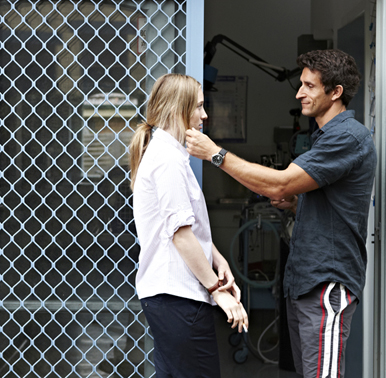
From the relative structural coherence of episode one, The Slap plummets to its lowest point of melodrama almost immediately in the second episode. Watching ‘Anouk’ (the character played by Essie Davis), it feels as though the creators went to the standard ‘Academy Award-winning topics’ checklist and, unable to pick one, hedged their bets and took the lot of them. The flimsiness of the slap as a fulcrum for an eight-episode series is emphasised in this episode’s opening reminder that ‘Anouk didn’t really see the slap when it happened’ but was noticing ‘something altogether more alarming’. That ‘something’ is the well-worn soap-opera trope of a middle-aged man making goo-goo eyes at the teenage babysitter. Having shifted our attention away from the event that supposedly grounds the narrative, ‘Anouk’ goes for the predictable trope of sex as a stand-in for real communication, cutting from her forlorn observation that ‘sometimes I have no idea if you’re even listening’ to going at it on the couch. As is the recurring theme in the series, the woman attempts to talk, but her man adopts a caveman-like silence, pushing through the efforts to communicate with a more pressing desire to fornicate (when not compulsively masturbating).
In contrast to the demon men we’ve seen (and will continue to see), Anouk has no relevance to the story – she essentially disappears after her episode – other than to provide a ‘girl power’ representation of a modern woman. As with the condemnation of masculine culture, this is not a problem in itself, but the attempt to stack the deck in Anouk’s favour results in the usual mess: too simplistic to be good art and too obvious to be good propaganda.
This deviation into Anouk’s endlessly troubled (and therefore endlessly validating) life ends when, after re-reading her childhood journal entry that predicts she’ll be a great writer, Anouk declares to herself ‘just fucking write then!’, immediately launching the standard ‘happy music’ and presumably showing that she’s taken a positive step away from the horrible world around her and the pointlessness of writing for a mere soap opera (her actual job). This self-empowerment and exorcism-through-writing resolution is the kind of feel-good fluff that gives ‘reputable’ artistic circles a bad name, essentially restaging Hollywood’s ‘believe in yourself’ trope for the literati.

The third episode, ‘Harry’, adds to the checklist of clichés: thieving employees, rich guy in pool with bikini-clad trophy wife, mistreated mistresses, religious angst during sex (looking up at a picture of Jesus while getting a hand-job), and so on. Episode four follows open-mouthed babysitter Connie (Sophie Lowe) into absent-parent territory (another abandoned woman) and sordid soap-opera thrills, while episode five reminds us how little the narrative is able to draw from the actual slap incident itself, with the trial finishing after about five minutes of the expected legal character assassination. We’re reminded that everyone is racist, Freudian uber-Mum Rosie lactates, her husband shows porn to his kid and gets violent with his wife (in front of the kid, naturally), shouts ‘fucking’ a lot, says ‘I hate you’, and then abandons his wife and children for the pub. Naturally, when the son (the slappee, incidentally) is seen watching television, the only line we hear from the screen is ‘I’ll kill you for this’, dragging the media fairly, but simplistically, into the never-ending equation of misery.
The general misery is immediately reaffirmed in episode six (‘Manolis’), in which we’re quickly informed by the ponderous voiceover that ‘God is a cocksucker’ and later that Manolis (Lex Marinos) is yet another borderline psychopath who has found that the ‘best way to control his rage was to not even look at [his wife] Koula’. The episode quickly continues with the series’ standard cocktail of sex and violence; Manolis shows moments of kindness only so that the producers can take them away again, confusing misanthropy for insight. The Slap’s monotonous view of the world might be summed up by a simple transition scene in this episode, in which Manolis walks down the street and stumbles, grabbing his knee in pain; like morbid comic strip creator Tom Bautik, who seems to live to make his artistic creations suffer, The Slap can’t even let Manolis walk down the street without finding some reason for absolute despair.

It’s worth noting that The Slap’s themes and cultural ideas have been explored countless times before in a variety of different ways. The immediate critical rush to praise the modern realism of The Slap might, in fact, point to a regression in the ability to analyse screen texts and narrative nuances. It’s odd to hear people nonchalantly dismiss the excesses of silent-era acting (the arm-waving, the heightened expressions), when nothing in the silent era ever approached the exaggerated flailing on offer here. Most of The Slap’s themes can be seen with more perspective and artistic care in anything from the excellent sci-fi film The Incredible Shrinking Man (Jack Arnold, 1957), to the film noir thriller Kiss Me, Deadly (Robert Aldrich, 1955), to episodes of Norman Lear’s social drama sitcoms All in the Family (1968–1979) and Maude (1972–1978). Even if audiences don’t find these last two examples especially funny, it’s difficult not to admire the lost art of brevity: these shows delve into their themes and make it out again in under half an hour, unlike The Slap’s eight hours of misanthropic repetition.
The Slap’s absence of humour also speaks to its lack of perspective: convinced of its own misery, it still can’t compete with works from comic masters like Charlie Chaplin in his City Lights (1931) or Mark Twain’s blistering novella The Mysterious Stranger for true glimpses into the rough undercurrents of life, mixed with touches of humour and beauty. Billy Wilder’s comedy The Apartment (1960) manages to navigate the pressures of masculinity, femininity, the capitalist web and the abuse of power, while finding a humour, a romanticism and a realism that can sit side by side without cancelling each other out.

If The Slap has a serious social agenda, then its issues deserve to be handled with care and sensitivity rather than smug, histrionic nihilism. If The Slap claims no social agenda, then it is merely misanthropic, sensationalistic soap opera, too childish in its outlook to truly earn its nihilism. The show approaches its content as though it’s pouring salt on a wound it has opened up in the Australian psyche. Unfortunately, its knife was blunt from the outset and it’s just wasting good salt.
I’m reminded of one last famous slap, at the end of Lindsay Anderson’s O Lucky Man! (1973), in which Malcolm McDowell’s character is told by an (in-film) director to ‘smile’. With a misanthropic pout, McDowell refuses, asking ‘what’s there to smile about?’ The director slaps McDowell across the face and, wouldn’t you know it, he smiles.
More information: <www.abc.net.au/tv/theslap>


